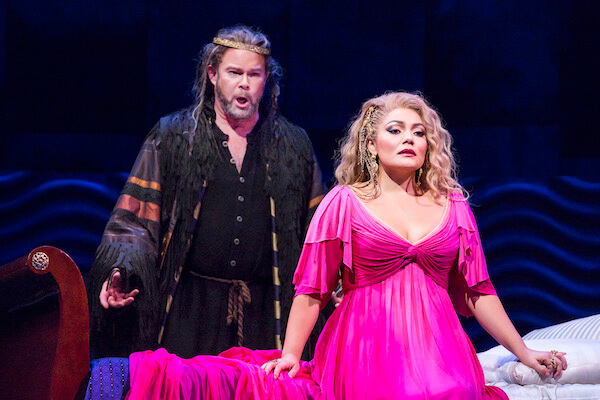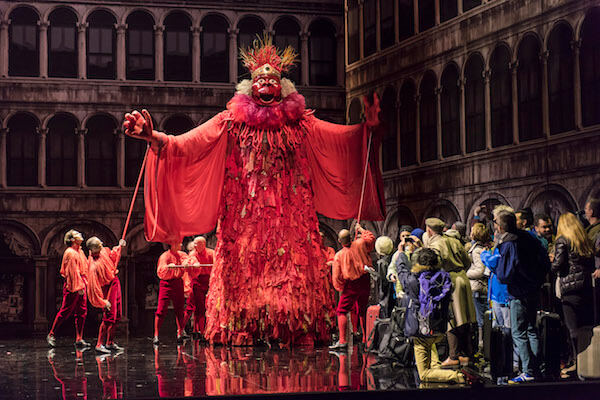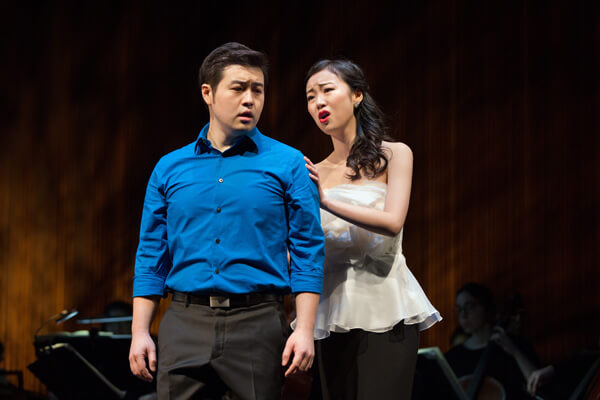Andrea Carroll and Craig Verm in the Gotham Opera production of Montsalvatge’s “El gato con botas.” | RICHARD TERMINE
At 32, the Met’s “Boheme” staging is older than the opera’s six leading characters are meant to be. It soldiers on, the crassly over-busy Act II bringing cheers, while the lovely snowy Act III restores some depth and taste. Score and even staging make for a good first opera experience, and the Met is circulating several worthy young singers into it through January 24.
The star November 24 was Sonya Yoncheva, a beautiful figure onstage who — unlike some other beautiful figures on major stages these days — commands a very fine voice, comfortable in all ranges and dynamics. She offered a straightforward, stylish Mimi.
Manhattan opera stages, large and small
The other soloist operating on her level was David Bizic’s generous-voiced, endearing Marcello. Francesco Demuro made an equivocal emergency debut, bringing feeling, decent presence, and genuinely italianate sound and diction to his work. Like so many lyric tenors, he sounded floored by the cumulative demands for volume that Puccini’s orchestration puts on Rodolfo. Alessio Arduini (Schaunard) and Matthew Rose (Colline) provided highly professional, pleasant-sounding turns.
The only sour ingredient was looks-cast Myrto Papatanasiu’s Musetta, rarely on pitch and vocally not remotely of Metropolitan standard.
At December 17th’s “Die Meistersinger” –– in general a very solid performance of an inert, borderline-kitsch staging — Martin Gartner, who had been singing Kothner, jumped in as Beckmesser. Gartner provided an admirably detailed performance, stressing traditional fussiness but seeming a real human being, and sang the part classily, without distortion. A fine save! Replacing him as Kothner, Ryan McKinny seemed –– like many of the Meistersingers –– far too young and sounded greatly reduced in volume from his once-clear promise as a Wagnerian comer. Though he tired on high notes after five (!) hours of singing, 66-year-old James Morris deserved genuine admiration for how cannily and solidly he got through his legato-based, relatively “regular guy” Hans Sachs.
Vocally the stars of the performance were Hans-Peter Koenig, a terrifically resonant Pogner, and the rich-toned Karen Cargill (Magdalene).
Johan Botha brought commendable stamina and accuracy to Walther and entered into the drama more than is his wont. Botha’s tone is impressive though not particularly ingratiating. Paul Appleby (David) was quite decent and should improve with time. Annette Dasch, a less-than-mediocre Countess Almaviva in 2009, returned as a less-than-mediocre Eva –– more looks casting.
James Levine sometimes slowed down alarmingly and there were more orchestral accidents than of yore, but he still brings a lot to this score.
Gotham Opera revived its splendid production of Montsalvatge’s 1947 “El gato con botas” (“Puss in Boots,” with performances alternated in language) on the Museo del Barrio’s charming little stage. Neal Goren and director Moises Kaufman and his Tectonic Theater Project should remount it every other year, as it’s a great show for young children as well as an attractive novelty for opera lovers.
Seen in English December 7, the puppets and partial puppets were enchanting, and musical values under Goren were high. Karin Mushegain brought a sweet, affecting mezzo with the ability to sustain long phrases to the Cat. Andrea Carroll’s Princess and Craig Verm’s Miller looked appropriately fairy-tale and sang very well. Kevin Burdette and the designers (Andromache Chalfant and Nick Barnes) collaborated to produce an applause-winning Ogre. Gotham brought the city a real holiday treat.
Another fine chamber company, the little opera theatre of new york, consistently offers interesting novelties. Two short pieces by Carlisle Floyd, “Slow Dusk” and “Markheim” showed different stages in the development of this key American composer, still at work at 88. The first work, from 1949, is really a student exercise, scanty and obvious of plot if sincere. The two male cast members –– tenor John Kaneklides (Micah) and mellow baritone Robert Balonek (Jess) — sang more agreeably than did their raw and overloud female colleagues.
“Markheim,” crafted for bass singing actor Norman Treigle in 1966, shows a great leap in craft and both musical and verbal sophistication (Floyd writes his own libretti). I’m not sure its blend of Dickensian melodrama and “Faust”-parody quite comes off, but it has some effective vocal writing and made a good vehicle for Tyler Putnam, precise of pitch and diction and visually convincing in the “dastardly ruined noble rake” title part.
Tenors Brent Reilly Turner (pawnbroker Josiah Creach) and Matthew Tuell (the diabolical Stranger) worked hard but effectively in music requiring challenging hurdles. As Tess the maid, Angela Mannino furnished sparkling clean coloratura and good line. Director Philip Shneidman often had singers addressing not one another but the audience. His best contribution was choosing the design team — Neal Patel (sets), Lara de Bruijn (costumes) and Nick Solyom (lighting), whose work proved handsome and evocative. Inessa Zartesky and Raymond J. Lustig provided chamber arrangements that worked in the intimate space of 59 East 59’s Theater A.
LOTNY, it’s audibly evident, can’t afford as much string ensemble rehearsal as Gotham, but on December 9 Richard Cordova worked superbly with the forces at hand, with the flute/ piccolo and oboe/ English horn chairs commendably filled.
Robert Mellon in the Manhattan School of Music production of Ernest Bloch’s “Macbeth.” | MANHATTAN SCHOOL OF MUSIC
Manhattan School of Music, on December 14, had a triumphant outing, plugging another local repertory gap with the American premiere of Ernest Bloch’s 1910 “Macbeth” in its original French version. The post-Wagnerian, Debussy-like score proved fascinatingly atmospheric and well worth revival in a fine performance led by Laurent Pillot that showed off the school’s vocal talent and production savvy impressively. Dona D. Vaughan’s staging was unfussily direct, finding the through-composed work’s dramatic pulse and adhering to it.
The Three Witches — of whom lower-voiced Lisa Barone and Niru Liu were vocally exceptional — proved key to the work and staging: Mozartean Three Ladies plus Wagnerian Norns and Rhinemaidens rolled into one. Alumnus baritone Robert Mellon (Macbeth) and striking Maria Natale (Lady Macbeth), a budding dramatic soprano, projected their wide-ranging music — and lust-fueled ambition — strongly. Other standouts included the Macduffs: cultivated baritone Xiaomeng Zhang, occasionally pressed at dynamic climaxes, rich-voiced Brittany Nickell in an affecting cameo scene as his wife, and young countertenor Jordan Rutter as their plucky, doomed son.
The whole ensemble delivered an impassioned performance, drawing out the work’s cohesive cinematic power and evoking apt cheers from a knowing industry crowd.
David Shengold (shengold@yahoo.com) writes about opera for many venues.





































